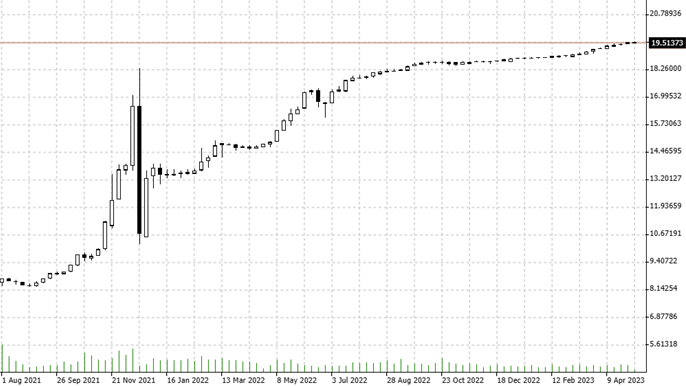

09.05.2023 – Turkey votes, many traders are now looking at the lira. Whether the decline continues is mainly a question of monetary policy. If the unspeakable Erdoganomics ends, then there is hope for a resurgence. If not, the only option at some point will probably be monetary reform.
A weekly chart like a mountain: Steadily, USDTRY is going uphill, which means that the Turkish lira is falling further and further. But things are anything but boring: the election on May 14 could bring momentum back into the forex market. Especially since now and then the state has intervened via the Turkish central bank. And by drastically ramping up interest rates for overnight lending killed a few shorts. For example, at year-end 2021, you can see that well from the jag. At such times, savvy traders rub their hands.

Source: Bernstein Bank GmbH
Should the old President Recep Tayyip Erdogan also be the new one, such blows to the lira pessimists are always possible. Only if the autocrat is replaced, there is hope for the lira bulls. That’s because Erdogan is the only person in the world convinced that lower key interest rates will help if the currency falls. Economists derisively call these views “Erdoganomics.”
Erdoganomics and Galloping Inflation
The pay and wages of the bureaucracy are paid for by cranking up the printing press. Companies are expected to borrow and invest at low interest rates. Ergo, inflation is galloping: According to Statista, the average inflation rate in Turkey in 2022 was a staggering 72 percent. For the current year, the statisticians forecast around 50 percent. In contrast, the key interest rate is downright measly: It was lowered by 0.5 percentage points to 8.5 percent in February. Low interest rates are also supposed to signal that everything is fine in the country.
Grandstanding on the Bosphorus
What is not the case: saber rattling in the Mediterranean against Greece; the attempt to shift the maritime borders unilaterally, thereby a threatening war for natural gas with Hellas, Cyprus, perhaps Israel. Hence naval rearmament – Turkey has just commissioned a helicopter carrier. And military adventures in Syria. Then there is the devastating earthquake damage, which is partly the result of botched construction due to rampant corruption on the Bosporus. All of this is not necessarily conducive to attracting tourists and foreign investors.
Whether opposition leader Kemal Kilicdaroglu will take power in the near future, despite the permanent economic crisis, remains to be seen. Kilicdaroglu may have a bachelor’s degree in economics and management, but he is rather uncharismatic, to put it diplomatically. Many Turks find the nationalistic ostentation of the current ruler much preferable.
Our conclusion: Perhaps economic sanity will return with an opposition election victory. Those who assume this will happen should go long and bet on a turnaround in the currency. But if Erdogan remains in power, the question is how and whether he will strengthen the Turkish lira again. Thus, it could be a fallacy to believe that the destruction of the foreign exchange will be stopped at some point. We are curious to see what happens next – and will keep you posted!
___________________________________________________________________________________________________________________________
The content of this publication is for general information purposes only. In this context, it is neither an individual investment recommendation or advice nor an offer to purchase or sell securities or other financial products. The content in question and all the information contained therein do not in any way replace individual investor- or investment-oriented advice. No reliable forecast or indication for the future is possible with respect to any presentation or information on the present or past performance of the relevant underlying assets. All information and data presented in this publication are based on reliable sources. However, Bernstein Bank does not guarantee that the information and data contained in this publication is up-to-date, correct and complete. Securities traded on the financial markets are subject to price fluctuations. A contract for difference (CFD) is also a financial instrument with leverage effect. Against this backdrop, CFD trading involves a high risk up to the point of total loss and may not be suitable for all investors. Therefore, make sure that you have fully understood all the correlating risks. If necessary, ask for independent advice. CFDs are complex instruments and are associated with the high risk of losing money quickly because of the leverage effect. 68% of retail investor accounts lose money trading CFD with this provider. You should consider whether you understand how CFD work and whether you can afford to take the high risk of losing your money.7
